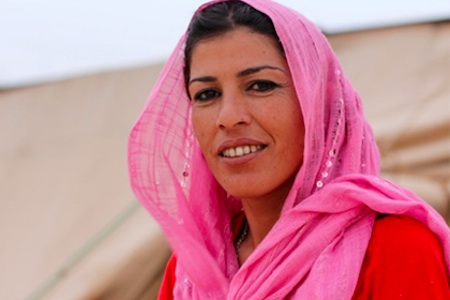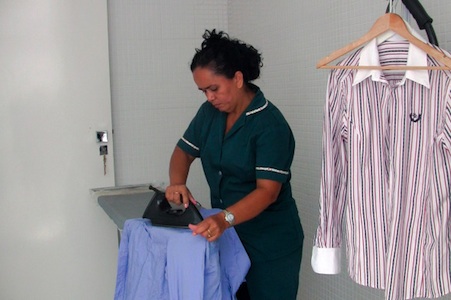“Life is much more than truth. And truly good cinema is able to get that,” Victor Kossakovsky says while being shot in Carlos’s Klein documentary Where the Condors Fly. Kossakovsky, whose work as a director was the spotlight of this year’s retrospective at IDFA, was captured by Klein during the production of ¡Vivan Las Antipodas! (2011). In the film, the Russian director is shown oscillating between overwhelmingly emotional and comically exasperated moments as he searches for the perfect shot and, like a true visionary of cinema, is both skeptical and in awe of everything around him. “Don’t film if you can live without filming” is one of the director’s rules, and he constantly asks himself and the audience what out there is still truly worth filming.
The International Documentary Film Festival Amsterdam celebrated its 25th annual edition this year with 317 titles from 69 countries, and vital issues certainly worth filming abounded in what is the largest celebration of documentary filmmaking of its kind in the world. This year’s program focused on looking forward, as much in terms of technology—with its DocLab interactive screenings and debates on the future of storytelling—as with its tendency to push for meaningful social change with a series of short documentaries in the Why Poverty? section and Focus Forward: Short Films, Big Ideas (which could be seen anytime throughout the day in two innovative Mini Cinemas parked on Rembrandtplein Square, the festival’s busy hub in downtown Amsterdam).
Entries in competition largely focused on current social and political issues, turning their gaze to severely conflicted parts of world, and creating an array of devastating and inspirational films.
In Rafea: Solar Mama, which premiered at TIFF earlier this year and found a large audience at IDFA, directors Mona Eldaief and Jehane Noujaim follow Rafea, a Bedouin woman who leaves her family in the impoverished border of Iraq and Jordan to go to India’s Barefoot College, where illiterate women from around the world are trained to become solar engineers. Rafae defies tradition and makes the audience cheer for the success of a pioneer with the power to propel meaningful social change in some of the world’s most forsaken communities. Powerful female voices struggling to be heard are also at the center of Bahrain: The Forbidden Country, where director Stéphanie Lamorré follows a group of women fighting against the deadly grip of Bahrain’s dictatorship. As impressive as the director’s ability to stay undercover and put herself in the line of danger is the determination with which these women face daily threats and oppression and somehow manage to maintain their fighting spirit.
Stories of radical leaders, espionage and social revolution were also portrayed in Alex Meillier’s directing debut, Alias Ruby Blade: A Story of Love and Revolution, which recounts the relationship between human rights activist Kristy Sword and East Timorese political leader Xanana Gusmão; and in the fascinating In the Dark Room, directed by Nadav Schirman, which exposes the complex family drama of famed terrorist Carlos the Jackal’s through revelatory interviews with former wife Magdalena Kopp and their daughter Rosa. Current and past Israeli conflicts were represented in Esther Hertog’s Soldier on the Roof, a Dutch production centered on the conflicts around the settlements along Israel’s West Bank city of Hebron, and surfaced again with The Gatekeepers, an eye-opening interview with six former heads of Israeli’s Intelligence Service Shin Bet.
Family tragedy is exposed in Katrine Riis Kjaer’s directorial debut, Mercy Mercy, which follows Masho and Roba, two Ethiopian children put up for adoption by their parents and taken into a family in Denmark. The result is enraging and devastating for both sides, as biological mother and father desperately fight the bureaucracy of the adoption system in order to receive news from their children, while their children cannot assimilate even after years of being adopted and their adopted parents can no longer cope. The camera gets very close to the pain of the children (unnecessarily at times), but even from a distance it is painfully clear that there is little hope of happiness for any of the parts involved. The director subtly contrasts basic expressions of love, such as cuddling and kissing, silently showing the abysmal cultural differences that might never be overcome, and opening a necessary debate about the moral issues at stake in this increasingly popular method of international adoption.
A disturbing look at a more extreme side of child abuse can be seen in Blush of Fruit, the directorial debut of Jakeb Anhvu and co-produced by Kim Nguyen (War Witch). In this unflinching and shocking portrayal of a Vietnamese orphanage, the audience is not spared the sight of neglect and physical abuse perpetrated by the caretakers. The film lets the subjects discuss the controversial donation-based system that sustains the organization without categorically assigning blame, but it doesn’t shy away from clearly displaying the heart-wrenching results.
Another powerful story coming out of the First Appearance Competition was Qi Zao’s Fallen City, a documentary about the Chinese city of Beichuan, which was completely destroyed by an earthquake in 2008. The director creates a sobering, yet hopeful portrayal that follows disassembled families struggling to rebuild their lives with a humbling sense of duty to their loved ones.
Environmental issues appeared in surprisingly very few documentaries this year. After Micha Peled’s Bitter Seeds, a documentary exposing the tragedy of Indian farmers committing suicide in increasing numbers since the introduction of genetically-modified seeds created havoc in the agricultural system and lead to the hopeless financial demise for the farmers, came to IDFA in 2011, Edouard Bergeon’s The Sons of the Land hit the same nerve at this year’s festival, showing a disturbingly similar trend in France, where hundreds of farmers commit suicide each year due to financial hardships, a phenomenon that goes largely unreported and forces us to question the unsustainable model of agriculture currently being adopted. On a similar but much more lighthearted vein, Yung Chang brought the international premiere of the mouth-watering The Fruit Hunters, which alerts about the dangers of our current monoculture-focused food-growing model. A large part of the documentary is monopolized by actor Bill Pullman’s passion for his fruit gardens in Hollywood to the detriment of exploring more exotic fruit and its hunters around the globe, but the film is still a sensual, tantalizing journey for the eyes—and, thanks to the fruit graciously distributed by the director after the film’s screening, satisfying for the taste buds as well.
Two very different documentaries from Brazil were also highlights of this year’s program. Director Gabriel Mascaro is yet another name outside of the dominant circle of Rio de Janeiro and São Paulo productions that has made make a splash in the international film circuit this year with Housemaids (Kleber Mendonça Filho, also based in Recife, collected critical acclaim at several festivals with Neighboring Sounds. Composed of home videos made by seven teenagers living in Brazilian households, Housemaids is a fascinating study of this long-standing Brazilian institution that is the live-in housemaid. By entrusting the family members with capturing the footage, Mascaro gets to the essence of these often undervalued, mostly underpaid workers whose jobs are much more than just sweeping and cooking. It creates a complex and blurry employee-employer relationship from which not only the children get emotional support in the absence of nonworking parents, and but which also supplements the housemaids’ common lack of positive family ties as they essentially become a part of the household. Not surprisingly, Gabriel Mascaro mentioned in one of the Q&As after his screenings that the film shocked Brazilian audiences when it premiered at the Brasilia Film Festival last month. It certainly touches on a sensitive issue that has been traditionally under analyzed, but that will gain increasing visibility as Brazil’s society keeps rapidly undergoing great social and economic changes.
Another Brazilian title arriving at IDFA after premiering in Brasilia Film Festival, where it collected several awards, was Petra Costa’s Elena. In her first feature-length project, Costa navigates through the pain of her sister Elena’s tragic and untimely death by creating a lyrical memorial with help of family home videos and voice recordings that her sister used to keep her impressions while pursuing her dream of an acting career in New York. By retracing her sister’s footsteps, the director envelops the audience in a painful, yet cleansing journey, from which she can emerge ready to allow the weight of her sister’s legacy to propel her forward instead of hold her back.
One of the films that have most captivated the audiences at this year’s IDFA also came from the First Appearance Competition. Little World, Marcelo Barrena’s directing debut, follows 19 year-old Albert, a Spanish boy in a wheelchair who sets off on a trip around the world across continents and oceans to reach New Zealand, the furthest point on the globe from his home in Barcelona. He decides to travel with his girlfriend, Anna, and the help of only 20 euros plus the kindness of stranger. Albert’s unwavering optimism in face of a crippling disease and family tragedy, and his unconditional love for life is enough to soften the heart of even the most jaded of filmgoers.
Another title with a magnetically charismatic central subject and one of the best films to emerge from this year’s festival was In the Shadow of the Sun. In yet another strong directing debut in the program, director Harry Freedman delves into the villages of Tanzania, where there is still the belief that body parts from albino people can be used by witch doctors to bring money and good fortune. This superstition has caused an atrocious wave of brutal killings of the albino populations across several communities, where albino people are persecuted, murdered in their sleep, or simply cast away in “camps” where they are not allowed to socialize with those of dark color. Freedman beautifully interlaces the stories of Josephat, an albino man who has spent most of his life fighting against discrimination, and Vedastus, a 15-year old albino kid struggling to find a school that will accept him, painting a heart-breaking picture of resilience, determination, and an astounding ability to survive, thrive, love and forgive despite living in perennial fear. “My village was my world, and my world was a bad place”, says Josephat. So he set out to change it.





